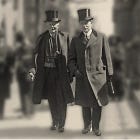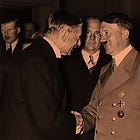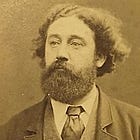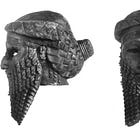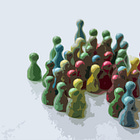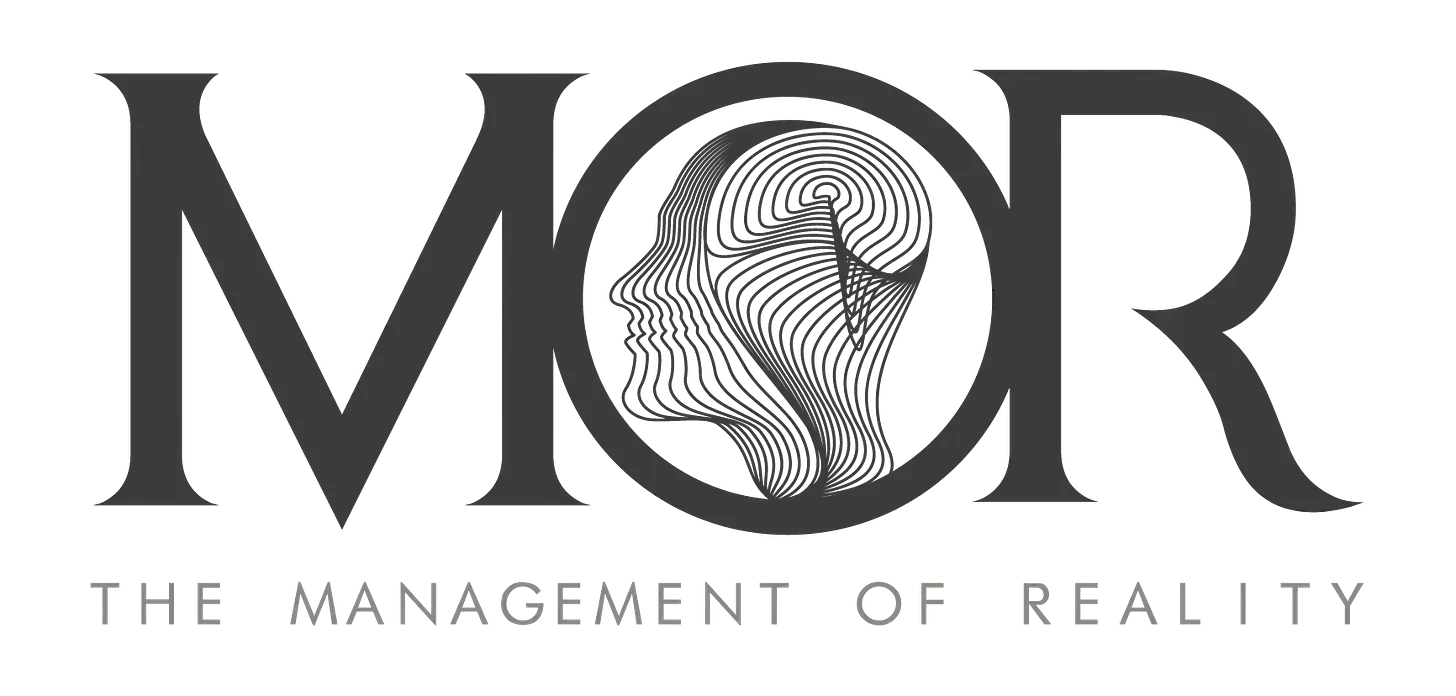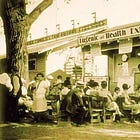The Orwellian signal
Can you spot the moment right before full-on, frank totalitarianism? Orwell could…
…the prevailing mental condition must be controlled insanity.
—George Orwell
Would-be totalitarians, if they can, will corrupt democracy.
The meaning system will then emit a diagnostic signal.
George Orwell discovered this signal.
If bureaucrats suddenly and crudely begin ordering everybody about at the point of a gun, citizens will know that totalitarianism is being imposed.
Yes, but what if the bosses are stealth totalitarians? What if they strut about like democrats while warming us slowly in the pot until, like the proverbial frog, we find ourselves cooked? That can be more difficult to spot.
It can be, yes. Unless you know that totalitarians—including clever ones stealthily preparing a silent coup at the top of a democracy—must always emit the same, loud, diagnostic signal. They cannot help it.
Panning for political gold in the river of language, George Orwell found this diagnostic signal in the meaning system: the semantic inversion. It may be the most important political discovery—ever.
The semantic inversion
To teach us this lesson, Orwell wrote a work of fiction, an allegory situated in an English-speaking super-State, frankly totalitarian in the most transparent sense (nothing subtle about it): Oceania.
Let us visit.
Looking out from your apartment window in London, “chief city of Airstrip One, itself the third most populous of the provinces of Oceania,” your eyes would take in the devastation of impoverishment that centralized control always imposes on nearly everyone:
“vistas of rotting nineteenth-century houses, their sides shored up with balks of timber, their windows patched with cardboard and their roofs with corrugated iron, their crazy garden walls sagging in all directions.”1
But your eyes would linger only briefly on that squalor, drawn now irresistibly to the center of visual gravity, a giant diamond set in all that scum:
“an enormous pyramidal structure of glittering white concrete, soaring up, terrace after terrace, three hundred meters into the air.”
Almost as tall as the Eiffel Tower! But massive rather than airy, dwarfing everything around it. The Ministry of Truth.
On the vast surface of the Ministry of Truth one could read, “picked out on its white face in elegant lettering,” the following Party slogans:
WAR IS PEACE
FREEDOM IS SLAVERY
IGNORANCE IS STRENGTH
The typeface was so incomprehensibly large it almost seemed like these slogans might be legible from space.
This powerful image—which encapsulates Orwell’s entire message—is encountered barely two pages into Orwell’s masterpiece, ‘1984’. Why the hurry? Orwell had seen the darkness of this world and he “knew that he was dying”—there was no time to waste. Rushing to his finish line “in a terrible, desperate burst of energy,” he went straight for the main lesson: Look, totalitarians always invert the meanings of politically relevant words.2
WAR IS PEACE
FREEDOM IS SLAVERY
IGNORANCE IS STRENGTH
Voilà: the semantic inversion.
In Oceania, the yelling of such slogans in State-imposed drill sessions was key to “reality control” (or what we call the management of reality). It was meant to induce what, in the official Newspeak (a bastardized English with a collapsed vocabulary to make thought impossible), was called doublethink:
“to hold simultaneously two opinions which canceled out, knowing them to be contradictory and believing in both of them, to use logic against logic.”3
War is Peace. Freedom is Slavery. Ignorance is Strength.
The Party slogans were important, of course, hence their symbolic prominence, ubiquity, and ritual centrality. But anything and everything that might be politically relevant in Oceania—anything that might significantly affect relationships between humans—was also structured to express a self-annihilating contradiction. To wit:
“The Ministry of Peace concerns itself with war, the Ministry of Truth with lies, the Ministry of Love with torture, and the Ministry of Plenty with starvation. These contradictions are not accidental, nor do they result from ordinary hypocrisy: they are deliberate exercises in doublethink.”4
The Ministry of Love was responsible for torture because it was home to the Thought Police. Yes, Love was “the really frightening one,”
“… a place impossible to enter except on official business, and then only by penetrating through a maze of barbed-wire entanglements, steel doors, and hidden machine-gun nests. Even the streets leading up to its outer barriers were roamed by gorilla-faced guards in black uniforms, armed with jointed truncheons.”5
Yes, because the Ministry of Love “maintained law and order.”
Law and order in a totalitarian State, as we know from history, are maintained by having every citizen inform on family, friends, neighbors, and coworkers. Everyone becomes a government spy. Even the children—no, especially the children.
“The children … were systematically turned against their parents and taught to spy on them and report their deviations. The family had become in effect an extension of the Thought Police.”6
“[H]ardly a week passed in which the Times did not carry a paragraph describing how some eavesdropping little sneak—‘child hero’ was the phrase generally used—had overheard some compromising remark and denounced his parents to the Thought Police.”7
The Ministry of Love’s Thought Police bred a society of snitches brimming with suspicion, fear, and hatred.
War is Peace. Freedom is Slavery. Ignorance is Strength. Love is Hatred.
The slogan Love is Hatred appears nowhere—as such—in Orwell’s novel. But you can extract it from the social and political structure that Orwell described. This is precisely what Orwell wanted. His story is—by careful design—nakedly transparent: training wheels to help us interpret the more opaque structure of our own real societies.
And what are the new euphemisms for ‘love’ in our modern Western societies? Diversity, Equity, and Inclusion (DEI). Those who resist DEI—and even many who comply (!), as Patrick Harrington from Kindness Yoga found—are oppressed with hatred (and sometimes they get violence).
Orwell’s deepest teaching
What Orwell called controlled insanity is absolutely necessary to the stability of a totalitarian State. In his words:
“if the High … are to keep their places permanently … then the prevailing mental condition must be controlled insanity”8
Controlled insanity requires the semantic inversion.
In other words, the semantic inversion is functionally obligatory for the stability of a totalitarian State. It simply cannot be dispensed with, any more than a farmer can dispense with seed. For it is via semantic inversion that nihilistic absurdity is planted in the mind, leaving the citizen in a state of learned helplessness where only one ‘choice’ remains: to obey Authority.
This may all be obvious to readers of Orwell. But there is another, less obvious, teaching here.
I believe that Orwell, given his historical and biographical context, was telling us something vitally important between the lines: that the semantic inversion is no less functionally obligatory for would-be or stealth totalitarians acting within a democracy.
In other words, long before they impose frank totalitarianism, stealth totalitarians holding effective power in a democracy must befog our minds with semantic inversions, teaching us learned helplessness. For unless they crush critical thinking first, they cannot hope to camouflage the system’s silent slide into totalitarian darkness.
It is this—the fact that would-be totalitarians must perforce proliferate semantic inversions—that makes these inversions (for those trained to spot them) honest and reliable signals that the power elites mean to enslave us.
If semantic inversions should begin to proliferate in a democracy, therefore, it is safe to conclude that the power elites are intervening our meaning systems to prepare us for the transition from a corrupted or counterfeit democracy—what I have also called sloppy totalitarianism—to a system that looks a lot more like Orwell’s Oceania (or the Soviet Union, or Nazi Germany, or China, or North Korea) and which I call frank (or tight) totalitarianism.
Any such transition is a fragile process. In consequence, citizens trained to spot the Orwellian signal may react in time to defend their rights and liberties and ruin the descent into frank totalitarianism.
This was Orwell’s deepest teaching. He meant to strengthen our democratic immune system by helping us see stealth totalitarians at work in a democratic society.
This deepest teaching, however, has not been stressed
It is usually explained that Orwell set his story in England, “as he put it, to show that the English were no better than anyone else and that the totalitarian danger existed everywhere.” His fictional Oceania, in Orwell’s backstory, had emerged from “the absorption … of the British Empire by the United States” because, we are told, Orwell meant to show that neither were Americans any better. According to these common views, Orwell set his novel in the year 1984—a mere three and a half decades into Orwell’s future—so that people would understand that would-be totalitarians might impose themselves on the unwary citizenry at any moment.9
But the truth, I believe, is even more somber: in 1948, stealth totalitarians were already running Orwell’s own country, Great Britain, and also the United States. This reality, which Orwell understood, is one that we at MOR have taken pains to document. Here follow some examples (this article continues below):
Orwell came to understand, by degrees, and then completely towards the end of his life, that stealth totalitarians were indeed already running the West, and he concluded, as we have, that the German Nazi movement had in fact been a creation of the Western bosses in their efforts to destroy Western democracy.10
But what this meant was that Orwell felt he couldn’t just come out and describe the system he had understood. That was too dangerous. And perhaps also premature—would anyone believe him? So…
Orwell wrote in code
If your brain, like mine, often perversely inverts the order of the last two digits when committing a number to memory, the similarity in the two dates—1948 and 1984—will have jumped at you. And it is no coincidence: as Christopher Hitchens points out, the title ‘1984’ was chosen as “an inversion of the year 1948 in which it was being completed.”11
Is this the key to a code? Did Orwell mean for us to read the year 1948 into his title ‘1984’? Was he telling us that the Western power elites in Britain and the US—in the year 1948—were already flooding us with doublethink-drenched Newspeak?
Yes, of course he was.
But then he had to write in code, else he would suffer a fate similar to that of his forerunner, Maurice Joly.
One whole century before Orwell, Maurice Joly had tried the strategy of explaining Orwell’s basic insights explicitly, telling the French people directly (essentially, though he did layer a thin veil) that their ‘liberal democratic’ government—ruled by Louis Napoleon Bonaparte (or ‘Napoleon III’)—had already been thoroughly corrupted in secret and would soon become a frankly totalitarian hell.
Almost certainly, George Orwell was aware of Maurice Joly, because Orwell, a journalist, was paying lots of attention to the propaganda, especially the propaganda transmitted in the British press. In 1921, the name ‘Maurice Joly’ was prominently associated in The Times of (London)—the British establishment newspaper—with an exposure of the ‘world domination’ Nazi propaganda against the Jews. It is hard to imagine that George Orwell, of all people on the planet, could have missed that.
Orwell, therefore, must have been keenly aware that simply describing the system had not worked very well for Maurice Joly. Almost immediately, Bonaparte had arrested Joly and thrown him in jail, followed by the swift confiscation of all copies of his book, The Dialogue, which was soon quickly and utterly forgotten.
But even supposing that Orwell, whose work evinces profound and striking similarities to that of Maurice Joly, somehow never heard of his talented forerunner, he would have had ample reason, anyway, to be careful and strategic. This question is ‘overdetermined,’ as social scientists like to say. Because Orwell’s own experience with the publication of Animal Farm had taught him the structure of the world, and had made plain the dangers of writing too transparently. Even a farm allegory, a sophisticated children’s story for adults, he learned, was not disguise enough.
He would have to write in code. Misdirect: pretend to be criticizing communists.
Here’s how it happened.
Orwell, Animal Farm, and the structure of the world
Animal Farm is now considered an immortal classic, but “[it] was almost denied publication.” Only one tiny publishing house, Secker & Warburg, condescended to print a handful of copies for a pitiful advance in 1945.12
Yet trouble finding a publisher is not what confirmed Orwell’s diagnosis of the Western system. No, that confirmation came after Secker & Warburg agreed to publish the book and some Ukrainian socialists became interested in it.
I must intrude here with a bit of context.
It was the immediate aftermath of World War II—a war started by the totalitarian Nazis. Many Ukrainians—the so-called ‘nationalists’—had joined the Nazis en masse as Hitler attacked Russia. But not the Ukrainian socialists. They had fought the Nazis—and paid the price. Now, however, the Ukrainian socialists worried about the Soviets! Indeed, the Soviets seemed little better than the Nazis…
Animal Farm—which was explaining in allegory form the perils of totalitarianism—appealed to these Ukrainian socialists, who managed to get one of the few copies “and immediately understood its profound relevance.” They got Orwell to write an introduction for a Ukrainian edition and he let them reprint it for free.
These fans of Orwell, worried about Ukraine’s future, wanted their fellow countrymen to read the translated Animal Farm, and they thought they’d begin with the Ukrainian refugees then languishing in displaced-person camps in Germany, which at the time was occupied, in the West, by the Western Allies and, in the East, by the Soviet Red Army.
Now watch:
“This edition [of Animal Farm] was distributed among [Ukrainian] refugees in Germany, but most copies were seized by the American military authorities (this, well after the war on Hitler was over) and handed over to the [Soviet] Red Army to be burned.”13 (emphasis mine)
I recommend that you slowly and deliberately review this in historical context so that you may taste and savor the remarkable structure.
I’ll help you.
The US military were crowing that they had defeated Adolf Hitler—you know, the book-burning, democracy-destroying, genocidal megalomaniac who’d just tried to enslave the entire planet—and they strutted for all the world like peacocks, Liberators of Europe, restorers of freedom and democracy. At the same time, the US military bosses seized copies of a book meant to strengthen freedom and democracy and… and… and gave this loot to the Soviets—another totalitarian nightmare—for burning!
Is that what you expect from genuine American democrats? Or is that more consistent with stealth totalitarians?
By way of answer, I give you two historical facts: right as the US military was getting Orwell’s book burned by the Soviets:
they were absorbing at least tens of thousands of German Nazi war criminals and their collaborators to create what we call the CIA (Central Intelligence Agency), as documented in 1988 by historian Christopher Simpson.
they recruited Shiro Ishii, the Japanese counterpart to the Nazi war criminal Dr. Joseph Mengele, and began secretly spraying experimental bioweapons on millions (yes, millions) of unwitting US citizens.
Orwell’s marketing strategy
In the context of the ‘shadowbanning’ (as we now say) imposed on Animal Farm, and knowing that his time was running out, Orwell felt keenly the need to get ‘1984’—which he considered of Earth-shattering importance—to a large mass audience.
His most terrifying—and only half-hidden—message was that, already in his own day, stealth-totalitarian bosses in the US and Britain were working hard to destroy the West. But how to communicate this terrifying message without offending the innocent and well-meaning administrators of the educational establishment who saw themselves as living in a democracy?
He would write in code: he would write a science-fiction allegory of the Soviet Union. And that would do the trick, Orwell guessed, because attacking the Soviet Union was politically correct.
Indeed, the year before Orwell finished ‘1984,’ which is to say in 1947, a widespread witch-hunt had already begun in the United States against presumed Soviet agents with the inauguration of the House Un-American Activities Committee (HUAC) in the US Congress. This persecution would soon be nicknamed McCarthyism, after its most telegenic and stalwart proponent: Senator Joseph McCarthy.
These alleged Soviet agents were officially presumed to be everywhere in the United States, and all manner of US citizens were dragged before special tribunals, accused with hearsay or less, and literally forced to ‘recant’ their supposed communism and to accuse others. Everybody and his second cousin got very busy hotly denying that they were secret agents of communism.
In this context, Orwell reckoned, everybody would believe that his ‘1984’ novel was just an allegory of the USSR (for the Soviet Union’s propaganda was indeed full of ridiculous semantic inversions). The innocents running the educational systems of the West would thus see ‘1984’ as a warning about a possible Soviet future coming to London, and not as a veiled conspiracy theory about a dark, totalitarian structure already strangling anglophone political systems—with Machiavellian corruption—in the year 1948.
It worked. Orwell’s marketing strategy was so successful that ‘1984’ became required reading in almost every Western high school, and Orwell himself became an adjective in every Western language. He is, in every sense of the word, a classic. In consequence, we’ve all been equipped with Orwellian metaphors and models that, given the right prodding, can arouse political enlightenment.
This is precisely what Orwell intended, as he knew that his book would be interpreted by readers living in a future generation.
Of course, any book that survives to be read beyond its time is interpreted by future generations. But Orwell was anticipating this outcome consciously, partly because communicating his insights to his own contemporaries seemed impossible, and partly because he knew that his insights would be timeless.
Orwell thus had Winston Smith, his protagonist, share Orwell’s predicament and also his solution: since Winston’s contemporaries would not listen to him explain the system, he would address himself (in his diary) to a future generation. Yet Winston did this in the full grip of dread and futility, because future generations, he feared, would also fail to get the message…
“How could you communicate with the future? It was of its nature impossible. Either the future would resemble the present, in which case it would not listen to [Winston], or it would be different from it, and his predicament would be meaningless.”14
But Orwell’s brilliant marketing solved the problem that his own protagonist could not. His book ‘1984’ is a literary ‘time capsule’ designed to become, in the first stage, a cultural milestone, a science-fiction classic, in hopes that, in a future time, its millions of readers might interpret the book correctly.
And now, here we are…
Millions of Westerners have read ‘1984’ in high school, or in a university course, for it is required reading in many places. But the question remains: can these readers spot the semantic inversions in their own societies?
Perhaps not, because the same educational establishment that turned Orwell into a classic has been busy destroying the critical thinking of young college-goers (much of that has been done, in the last couple of decades, with Qatari money). But I believe we can still turn on the lights in those heads by pointing out how perfectly Orwell applies.
Orwellian inversions in present Western societies
MOR is examining the most significant Orwellian semantic inversions now currently being imposed on Westerners. We have a dynamically growing list of our analyses in the Appendix (below).
As you will see when you consult it, we are in fact awash in Orwellian semantic inversions. And this ain’t new. Doublethink has befogged our minds for a long time—the process is well advanced. Unless this generation can now awaken to identify and process the Orwellian signal as George Orwell intended, we will soon be living in a frankly and openly totalitarian system, and all our rights and liberties will be extinguished.
But here’s hoping for a New Enlightenment. Cheers!
APPENDIX - A Catalogue of Orwellian inversions
We have, first of all, the classic and obligatory inversions, clearly identified by Orwell himself:
War is Peace
Freedom is Slavery
Gil-White, Francisco, Were the Greeks Any Good? WEIRD Morality, Democracy, and the Semiotic Paradox of Classical Historiography (April 23, 2020).
http://dx.doi.org/10.2139/ssrn.3583957
Ignorance is Strength
(coming soon…)
Love is Hatred (or Bigots are Antiracists)
And we also have some new inversions that never occurred to Orwell, such as:
A Man is a Woman.
The Cure is the Disease.
We Attack You to Protect You
And the most important Orwellian inversion of all:
The Weak are the Strong
And a related one—at least in present deployment:
Humanitarianism is Genocide
Orwell, George (2003[1949]). Animal Farm And 1984. HarperCollins. Kindle Edition. (p.90)
Hitchens, Christopher (2003). Introduction to Animal Farm And 1984. HarperCollins. Kindle Edition. (loc. 30)
Animal Farm And 1984 (op. cit.) p.119
Animal Farm And 1984 (op. cit.) p.292
Animal Farm And 1984 (op. cit.) p.92
Animal Farm And 1984 (op. cit.) p.212
Animal Farm And 1984 (op. cit.) p.109
Animal Farm And 1984 (op. cit.) p.291
Introduction to Animal Farm (op. cit.) loc. 79
On Orwell’s growing realization that that the Nazi movement was being supported by the Western bosses—in particular, the British bosses—do a search for ‘Orwell’ in the following piece:
On the documentation that the Western bosses did indeed finance and lead the international movement that, in German, became German Nazism, read:
Introduction to Animal Farm (op. cit.) loc. 79
Introduction to Animal Farm (op. cit.) loc. 30, 54
Introduction to Animal Farm (op. cit.) loc. 54
Animal Farm And 1984 (op. cit.) p.93






